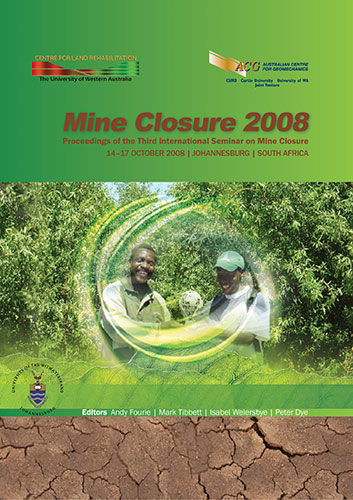Minimization of Socio-Economic Impacts During Mine Closure

|
Authors: Miradouro, L; Piagentini, SM; Costa, MRSM Paper is not available for download Contact Us |
DOI https://doi.org/10.36487/ACG_repo/852_79
Cite As:
Miradouro, L, Piagentini, SM & Costa, MRSM 2008, 'Minimization of Socio-Economic Impacts During Mine Closure', in AB Fourie, M Tibbett, I Weiersbye & P Dye (eds), Mine Closure 2008: Proceedings of the Third International Seminar on Mine Closure, Australian Centre for Geomechanics, Perth, pp. 853-862, https://doi.org/10.36487/ACG_repo/852_79
Abstract:
Votorantim Group, one of the largest Brazilian conglomerates, was founded 90 years ago, and has since been committed to productive investments, sustainable growth, and social responsibility. It operates in eight different business areas, with metals accounting for more than 30% of the group’s income. The closure of their industrial unit’s nickel mine situated in Fortaleza de Minas, MG, Brazil is scheduled to take place in 2010. The group has been addressing this issue since 2003, through a project aiming at socio- economic development and income generation in the city, where the industrial unit is located, in order to cope with the environmental aspects involved and stakeholders’ socio-economic expectations. The challenge consists of mitigating the socio-economic impact of a tax-collection reduction of 30% on potential unemployment growth. The project, An Eye in the Future, was designed in order to provide the implementation of a sustainable model for Fortaleza de Minas local development, capable of leading to economic prosperity, environmental quality of the ecosystem, and strengthening the community. The project is based on the premise of systemic thinking, and adopts the following methodological tools: interconnectivity or interdependence, respect for diversity, sharing, co-responsibility, recycling or energy and resources exchange, and flexibility. The scientific rationality added to the subjectivity (basis of the systemic thinking) favors the achievement of the projected results, such as standards and paradigms shift, solutions for intrapersonal and interpersonal conflicts, personal and collective transformation and the construction of a new development model.
References:
Dinis, G. (2004) Centros de Inovação para o Eco-desenvolvimento. 4th Biennial International Workshop. June 16-19.
Advances in Energy Studies. Ecology-Energy Issues in Latin America.
Feuerstein, R. and Rand, Y. (1974) Mediated Learning Experiences: An Outline of the Proximal Etiology for
Differential Development of Cognitive Functions. International Understanding, 9/10, 7-36, Spr.
Ortega (2001) Faculdade de Economia e Administração, Universidade Estadual de Campinas. São Paulo, Brasil.
Taveira, A.L.S. (2003) Provisão de recursos financeiros para o fechamento de empreendimentos mineiros. Escola
Politécnica – Universidade de São Paulo. São Paulo, Brasil.
© Copyright 2026, Australian Centre for Geomechanics (ACG), The University of Western Australia. All rights reserved.
View copyright/legal information
Please direct any queries or error reports to repository-acg@uwa.edu.au
View copyright/legal information
Please direct any queries or error reports to repository-acg@uwa.edu.au